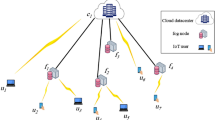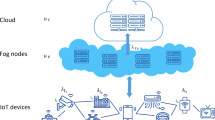Abstract
Developing the edge and fog computing has been the result of the fast growth of cloud-based IoT applications. These new paradigms define new resource management problems such as IoT task offloading challenge. Despite the many conducted effort in the IoT task offloading, this issue remains a research gap partly because this problem is NP-hard inherently, and also because many proposed solutions are based on unrealistic assumptions. Indeed, many proposed solutions suffer from the lack of a real set of tasks for a comprehensive evaluation. Thus, we prepare a collection of Python tasks to provide a realistic context for the assessment of the proposed task offloading methods. Also, this paper proposes a four-tier architecture to determine the specific decision-maker for the task offloading. Then, we formulate this problem as a population (evolutionary) game that is solved by Maynard replicator dynamics. The time and energy consumption are the main optimization objectives in this work. Finally, we simulate the proposed scheme in MATLAB by emphasizing the use of realistic values and parameters. The experimental results indicate that our scheme is a practical approach partly because it contributes to the core traffic decreases and because its convergence time is less than 6 s to solve the problem with 100 tasks.










Similar content being viewed by others
References
40 Internet of Things statistics from 2019 to justify the rise of IoT. https://techjury.net/stats-about/internet-of-things-statistics/. Accessed 06/17/2019
What’s new with the internet of things? | mckinsey. https://www.mckinsey.com/industries/semiconductors/our-insights/whats-new-with-the-internet-of-things. Accessed 06/17/2019
Zhang H, Xiao Y, Bu S, Niyato D, Yu FR, Han Z (2017) Computing resource allocation in three-tier IoT fog networks: a joint optimization approach combining Stackelberg game and matching. IEEE Internet Things J 4(5):1204
Muñoz R, Vilalta R, Yoshikane N, Casellas R, Martínez R, Tsuritani T, Morita I (2018) Integration of IoT, transport SDN, and edge/cloud computing for dynamic distribution of IoT analytics and efficient use of network resources. J Lightwave Technol 36(7):1420
Dastjerdi AV, Buyya R (2016) Fog computing: helping the internet of things realize its potential. Computer 49(8):112
Schulz P, Matthe M, Klessig H, Simsek M, Fettweis G, Ansari J, Ashraf SA, Almeroth B, Voigt J, Riedel I et al (2017) Latency critical IoT applications in 5G: perspective on the design of radio interface and network architecture. IEEE Commun Mag 55(2):70
Edge computing vs. fog computing: Definitions and enterprise uses—CISCO. https://www.cisco.com/c/en/us/solutions/enterprise-networks/edge-computing.html. Accessed 06/17/2019
Adhinugraha K, Rahayu W, Hara T, Taniar D (2020) On internet-of-things (IoT) gateway coverage expansion. Future Gen Comput Syst 107:578
Myerson R (2013) Game theory. Harvard University Press, Cambridge. https://books.google.com/books?id=oGUET9JBytEC
Misra S, Saha N (2019) Detour: dynamic task offloading in software-defined fog for IoT applications. IEEE J Sel Areas Commun 37(5):1159
Chen M, Hao Y (2018) Task offloading for mobile edge computing in software defined ultra-dense network. IEEE J Sel Areas Commun 36(3):587
Chamola V, Tham CK, Chalapathi GS (2017) In: 2017 IEEE International Conference on Pervasive Computing and Communications Workshops (PerCom Workshops) (IEEE 2017), pp 587–592
Xu J, Ren S (2016) In: 2016 IEEE Global Communications Conference (GLOBECOM) (IEEE, 2016), pp 1–6
Zhao X, Zhao L, Liang K (2016) In: International Conference on Heterogeneous Networking for Quality, Reliability, Security and Robustness. Springer, Berlin, pp 293–301
Ye D, Wu M, Tang S, Yu R (2016) In: 2016 IEEE 3rd International Conference on Cyber Security and Cloud Computing (CSCloud) (IEEE, 2016), pp 247–251
Alam MGR, Tun YK, Hong CS (2016) In: 2016 International Conference on Information Networking (ICOIN) (IEEE, 2016), pp 285–290
Liang K, Zhao L, Zhao X, Wang Y, Ou S (2016) Joint resource allocation and coordinated computation offloading for fog radio access networks. China Commun 13(Supplement2):131
Tran DH, Tran NH, Pham C, Kazmi SA, Huh EN, Hong CS (2017) OaaS: offload as a service in fog networks. Computing 99(11):1081
Chiti F, Fantacci R, Picano B (2018) A matching theory framework for tasks offloading in fog computing for IoT systems. IEEE Internet Things J 5(6):5089
Liu L, Chang Z, Guo X, Mao S, Ristaniemi T (2017) Multiobjective optimization for computation offloading in fog computing. IEEE Internet Things J 5(1):283
Meng X, Wang W, Zhang Z (2017) Delay-constrained hybrid computation offloading with cloud and fog computing. IEEE Access 5:21355
Khan JA, Westphal C, Ghamri-Doudane Y (2017) In: 2017 29th International Teletraffic Congress (ITC 29). IEEE, vol 1, pp 223–231
Ahn S, Gorlatova M, Chiang M (2017) In: 2017 IEEE MIT Undergraduate Research Technology Conference (URTC). IEEE, pp 1–4
Newton R, Toledo S, Girod L, Balakrishnan H, Madden S (2009) In: NSDI, vol 9, pp 395–408
Bozorgchenani A, Tarchi D, Corazza GE (2017) In: 2017 International Symposium on Wireless Communication Systems (ISWCS). IEEE, pp 390–395
Bozorgchenani A, Tarchi D, Corazza GE (2017) In: GLOBECOM 2017–2017 IEEE Global Communications Conference. IEEE, pp 1–6
Zhu Q, Si B, Yang F, Ma Y (2017) Task offloading decision in fog computing system. China Commun 14(11):59
Chang Z, Zhou Z, Ristaniemi T, Niu Z (2017) In: GLOBECOM 2017–2017 IEEE Global Communications Conference. IEEE, pp 1–6
Bao W, Li W, Delicato FC, Pires PF, Yuan D, Zhou BB, Zomaya AY (2017) In: Proceedings of the 20th ACM International Conference on Modelling, Analysis and Simulation of Wireless and Mobile Systems. ACM, pp 99–108
Mukherjee A, Deb P, De D, Buyya R (2018) C2OF2N: a low power cooperative code offloading method for femtolet-based fog network. J Supercomput 74(6):2412
Wang X, Ning Z, Wang L (2018) Offloading in internet of vehicles: a fog-enabled real-time traffic management system. IEEE Trans Ind Inf 14(10):4568
Liu L, Chang Z, Guo X (2018) Socially aware dynamic computation offloading scheme for fog computing system with energy harvesting devices. IEEE Internet Things J 5(3):1869
Shah-Mansouri H, Wong VW (2018) Hierarchical fog-cloud computing for IoT systems: a computation offloading game. IEEE Internet Things J 5(4):3246
Narahari Y (2014) Game theory and mechanism design, vol 4. World Scientific, Singapore
Tadelis S (2013) Game theory: an introduction. Princeton University Press, Princeton
Osborne MJ, Rubinstein A (1994) A course in game theory. MIT Press, Cambridge
Mertens J, Sorin S, Zamir S (2015) Repeated games. Econometric society monographs. Cambridge University Press, Cambridge. https://books.google.com/books?id=AuYlBgAAQBAJ
Chakravarty S, Mitra M, Sarkar P (2015) A course on cooperative game theory. Cambridge University Press, Cambridge. https://books.google.com/books?id=sp-TBQAAQBAJ
Curiel I (2013) Cooperative game theory and applications: cooperative games arising from combinatorial optimization problems. Theory and decision library C . Springer, New York. https://books.google.com/books?id=BoXdBwAAQBAJ
Nisan N, Roughgarden T, Tardos E, Vazirani V (2007) Algorithmic game theory. Cambridge University Press, Cambridge. https://books.google.com/books?id=YCu2alSw0w8C
Easley D, Kleinberg J (2010) Networks, crowds, and markets: reasoning about a highly connected world. Cambridge University Press, Cambridge. https://books.google.com/books?id=atfCl2agdi8C
Sandholm W (2010) Population games and evolutionary dynamics. Economic learning and social evolution. MIT Press, Cambridge. https://books.google.com/books?id=pZH6AQAAQBAJ
Iot pet feeder—arduino project hub. https://create.arduino.cc/projecthub/circuito-io-team/iot-pet-feeder-10a4f3. Accessed 06/28/2019
Truebench—linux cpu benchmarking system. https://truebench.the-toffee-project.org/index.php?page=home. Accessed 06/30/2019
Kurose J, Ross K (2017) Computer networking: a top-down approach. Pearson, London. https://books.google.com/books?id=OljpOAAACAAJ
Pdtoolbox\_matlab—file exchange—matlab central. https://www.mathworks.com/matlabcentral/fileexchange/. Accessed 07/11/2019
Numpy—numpy. https://www.numpy.org/. Accessed 07/11/2019
Statistics—mathematical statistics functions—python 3.7.4 documentation. https://docs.python.org/3/library/statistics.html. Accessed 07/11/2019
Pydes pypi. https://pypi.org/project/pyDes/. Accessed 07/11/2019
Hashlib—secure hashes and message digests—python 3.7.4 documentation. https://docs.python.org/3/library/hashlib.html. Accessed 07/11/2019
Scikit-image: image processing in python—scikit-image. https://scikit-image.org/. Accessed 07/11/2019
Home—scikit-video 1.1.11 documentation. http://www.scikit-video.org/stable/. Accessed 07/11/2019
Azure latency test—azure speed test. http://www.azurespeed.com/. Accessed 07/14/2019
Power consumption benchmarks | raspberry pi dramble. https://www.pidramble.com/wiki/benchmarks/power-consumption. Accessed 07/14/2019
Author information
Authors and Affiliations
Corresponding author
Additional information
Publisher's Note
Springer Nature remains neutral with regard to jurisdictional claims in published maps and institutional affiliations.
Rights and permissions
About this article
Cite this article
Mahini, H., Rahmani, A.M. & Mousavirad, S.M. An evolutionary game approach to IoT task offloading in fog-cloud computing. J Supercomput 77, 5398–5425 (2021). https://doi.org/10.1007/s11227-020-03484-8
Accepted:
Published:
Issue Date:
DOI: https://doi.org/10.1007/s11227-020-03484-8




